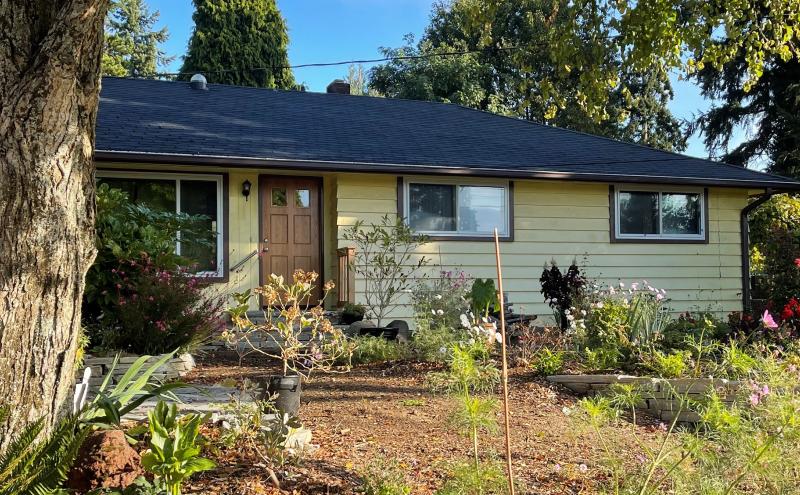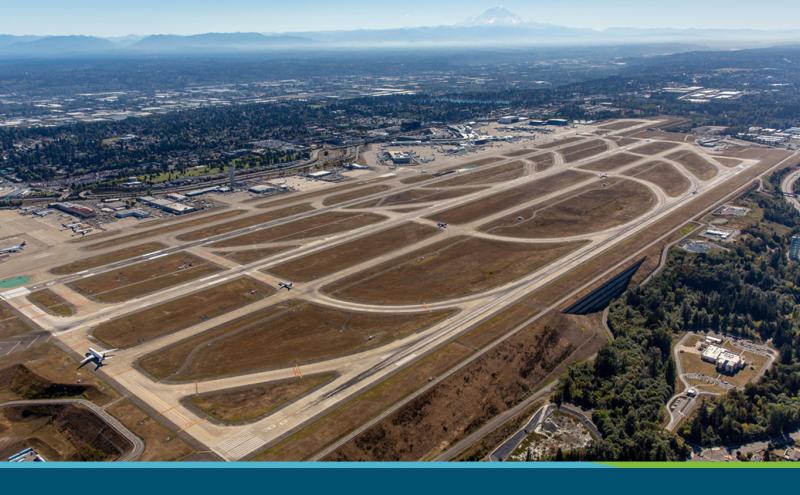
Multiple priorities advocated by the Port of Seattle and communities near Seattle-Tacoma International Airport (SEA) are part of the final text of the Federal Aviation Administration (FAA) Reauthorization bill passed by the House of Representatives today. These provisions include ways to address aircraft emissions, FAA noise mitigation policies, support for additional regional airport capacity, and adds flexibility on how the Port can address the long-term future of North SeaTac Park. The Port applauds the tenacious work by the state’s congressional delegation to ensure the inclusion of these regional priorities.
Over the last several years, the Port and six near-airport cities have come together through the SEA Stakeholder Advisory Round Table (StART) to identify and jointly advocate for shared priorities to address aircraft noise and emissions. This effort included the first-ever StART D.C. Fly-in, which sent 20 local and state elected officials and staff to the nation’s capital to advocate for the inclusion of mutually agreed upon aircraft noise and emissions reduction policies. Key policies in the FAA Reauthorization bill include:
- A study of ultrafine particulates from aircraft engines
- A one-year deadline for FAA action on potential changes to current federal aircraft noise policy (including noise metrics for residential sound insulation) and the creation of a stakeholder advisory panel to include area residents
- A regional airport capacity report, and
- The renewal of an environmental mitigation pilot program that provides grants to support new technologies and approaches to reducing aircraft noise and emissions
“The Port of Seattle Commission has worked diligently to partner with every level of government from local city councilmembers all the way up to our federal congressional delegation to ensure we made progress on these critical priorities for near-airport communities. Last year I was honored to join representatives from near-airport communities in Washington, D.C., to advocate for these issues, and I am so happy to see what that effort has achieved,” said Port of Seattle Commission President Hamdi Mohamed. “We are particularly grateful for the leadership of Senate Commerce Committee Chair Maria Cantwell and House Transportation and Infrastructure Committee Ranking Member Rick Larsen for their steadfast support in bringing the final legislation through the finish line.”
StART is a collaborative forum to share information, discuss near-airport cities’ concerns, and provide feedback to the Port on issues related to the airport. Each city designates three members to serve on StART, and they are joined by airline representatives, an air cargo representative, and Port staff. SEA Airport Managing Director Lance Lyttle leads StART, and the FAA provides agency expertise.
“As a participant in last year’s StART D.C. Fly-in, I was able to witness firsthand the power of effective collaboration as the Port, community members, and their elected officials gathered into agreement regarding aircraft noise and emissions policy advocacy,” stated Des Moines Mayor Traci Buxton. “We are stronger together, and this inclusion of so many of our shared priorities is proof that partnership works.”
“The FAA Reauthorization Act takes a big step forward in protecting the future health of airport communities,” said City of SeaTac Mayor Mohamed Egal. “I am appreciative of our U.S. senators and representatives for listening to the needs of our underserved SeaTac residents.”
In addition to the StART priorities, the legislation includes a provision that provides the Port with more flexibility to determine the future of North SeaTac Park. Under current law, the FAA would have a bigger role in directing uses of the park because it was purchased with federal funding; however, the new policy allows the Port to move forward with what it determines to be the best use of that land, including a potential decision to preserve the property permanently as a park.
“The Port has no plans to develop property within North SeaTac Park, and the Commission believes strongly that parks and greenspaces are essential to the health and quality of life of airport communities. We have heard clearly from the City of SeaTac and surrounding communities that their desire is to see this land remain exclusively for park use, and we will consider that input strongly as we go through the next steps in our process. I am deeply grateful to the Washington congressional delegation – particularly Senator Cantwell and Representatives Larsen and Smith for including this important provision in the FAA Reauthorization. Importantly, it enables the airport to grow while giving the Port the additional flexibility to address the needs of near-port communities,” said Port of Seattle Commissioner Fred Felleman.
The bill passed the Senate on May 9, followed by the House’s approval this afternoon, sending the measure to the president’s desk for signature before Friday’s authorization deadline.
The Port will continue to work closely with members of the State Legislature who have also been partners in identifying aircraft noise and emissions issues as a priority for state funding and support.
Continuing progress with StART
StART continues to pursue collaborative efforts through its Aviation Noise Working Group by identifying tangible, near-term changes that can happen in partnership with the FAA and SEA’s airline tenants and would result in solutions to address community concerns related to aviation noise. These include late night noise reduction programs and direct communication with airlines to provide noise relief.
Port sound insulation efforts
Most recently, the Port approved a $5 million pilot program for insulation repair and replacement for near-airport communities. In 2020, the Port accelerated its sound insulation projects for homes, apartments, condominiums, and places of worship to be completed in less than half its scheduled timeline. Since then, the Port approved $40 million for more than 215 apartment units, began insulation of the first condominium units, procured $35 million in funding from the FAA Airport Improvement Program, and approved $25.9 million in funding for places of worship.
More details on sound insulation
The Port has completed nearly $300 million in sound reduction improvements for communities surrounding the airport. Sound insulation near the airport is typically funded with approximately 80% in grants from the FAA and 20% funding from SEA Airport revenues. Completed work includes:
- Installation of sound insulation in over 9,400 single-family homes
- Sound insulation in 246 condo units in five complexes
- Investments of $100 million for sound insulation ($50 million from the Port and $50 million from the FAA) in noise-impacted school buildings — 10 of 15 identified schools are complete
- Expenditures of $14 million for sound insulation in 14 Highline College buildings
For more information, and to see if your home may qualify for sound insulation, learn more about the process.
Contact
Perry Cooper | SEA Airport
(206) 787-4923 | [email protected]





